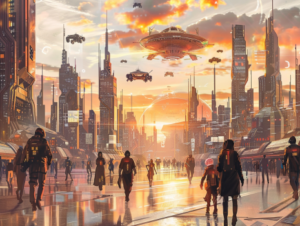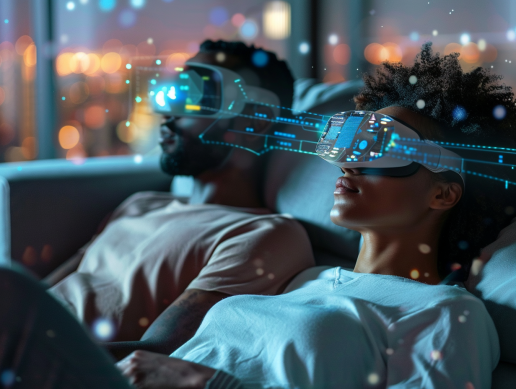“Alexa, dim the lights and put on some mood music.”
In an instant, the lounge fills with sultry saxophone melodies. Your partner enters wearing lingerie ordered by your new “relationship assistant” AI. As things heat up, nanobots in the sheets release oxytocin to strengthen emotional bonding. Afterward, the AI counsel techniques are drawn from studying your biometrics for enhanced intimacy next time.
This titillating yet troubling vision encapsulates our era’s defining question: how will artificial intelligence (AI) transform sex, relationships, and the very meaning of human connection?
The Primal Lure of Sex and Love

We hustle for wealth to augment dating leverage. We hit the gym targeting aesthetic gains that attract mates. Many take up instruments attempting to serenade potential partners with skillful sonnets. From our choice of footwear to fragrance, subconscious sexual signaling permeates everyday decisions.
Of course, life holds more than carnal cravings. Beyond misguided machismo, we yearn for meaningful relationships despite difficulty admitting it. We desire passion’s vivifying electricity to counter boredom’s nagging malaise. Some seek familial bonds nurturing the next generation. Regardless of the stage in life, the central question remains: What drives us besides survival and replication? Enjoyment? Self-actualization? The pursuit of knowledge? Contributing to the greater good?
As AI enters the emotional terrain once solely human domain, these motivations may dramatically transform. When algorithmic systems can satisfy our every physical and psychological need, will investable relationships lose all cachet?
When Romance Meets AI: Brief Observations From Today

We already witnessed technology reshaping intimacy in profound ways.
Teledildonic devices enable erotic physical connection with willing partners worldwide. AI porn generates customized adult films catering to unique predilections. Apple patented augmented reality contact lenses overlaying chosen appearances onto people. When sight through our eyes becomes customizable, distinguishing facsimile from fact grows impossible.
Dating apps confirm that access abundance often overrides meaning. Endless romantic possibilities breed expectations of instantaneous gratification rather than patient courtship. When Tinder ignited the online dating explosion, some predicted a relationship renaissance as effortless networking powered more connections. Yet shallow swiping based on appearance afforded little room for rapport-building. Ironically, the quest for love left many lost in romantic chaos.
Just as abundant food choices drive overeating despite nutrition debt, dating apps overindulge our primal mating drive without fulfilling core emotional needs. Our heirs may view this era of technologically turbocharged yet relationship-starved dating as an apprenticeship on how not to incorporate technology in intimacy.
When Every Need Gets Met At A Whim: Potential Futures
Make no mistake – we accelerate into uncharted territory regarding technology’s relationship impacts. While amateur seducer “gurus” proliferate advice online, even experts face irrelevance as AI matching and dating platforms gain adoption. Once algorithms reliably reverse engineer attraction’s psychological underpinnings, what use remains for those peddling seductive secrets?
Likewise, many scientists predict advanced AI will simulate satisfaction in ways unrivaled by reality. Companies race to develop hyper-realistic sex robots expertly catering to one’s unique erotic palette. Some observers herald this as freeing humanity to pursue deeper spiritual and emotional bonds formerly cluttered by carnal burdens. Yet that optimism contradicts evidence suggesting convenience often overrides meaning.
When one can summon a flawless AI companion on demand to meet any need, will the gritty work of building rapport with a flawed human lose all appeal? What drives us to engage each other when artificially engineered perfection beckons? Will technological abundance birth a relationship renaissance – or rapid extinction?
To grapple with this unfamiliar terrain, we must first strip away techno-utopian fallacies. Despite noble aspirations that automation frees humanity for self-actualization, inconvenient truths weigh against such fanciful optimism. When ease of access spawned all-you-can-eat buffets, obesity, and dietary struggles ensued despite improved food availability. So too dating apps promise enhanced connections yet often leave users feeling dislocated and unfulfilled.
If AI swiftly satisfies our every health need, how long can medical professionals forestall irrelevance? Should artists continue creative efforts once algorithms generate on-demand multimedia surpassing human output? When AI tutors outperform the most masterful teachers, what role remains for educators? And if these pillars of society fade in significance, how long can civilization’s foundation endure?
From Sexbots to Spirituality: Charting Technology’s Impact on Humanity’s Needs

Maslow’s famed hierarchy of needs provides a framework for assessing where automation threatens – or possibly propels – human development.
Physiological needs like food, water, and shelter may soon reach abundance thanks to progress in renewable resources, fusion energy, and molecular assembly. Likewise, inventions like teledildonics and programmable AI lovers may sate most physical cravings on demand.
Safety from harm risks regression, however, with digital disinformation sowing societal distrust. Yet surveillance systems smart enough to precisely target violence while upholding civil liberties could create new windows for conflict resolution.
Belonging and intimacy appear jeopardized as personalized AI companions and VR environments supplant human collaboration. However, automated governance could enable unprecedented democratic participation.
Esteem through achievement loses clarity once robots and algorithms outperform people on every metric from sports to intellect. However, fame itself may diminish if VR and neurotech grant superior experiential pleasures.
As lower human needs reach fulfillment by automation, one intriguing possibility remains – that space opens for exploring self-actualization and spirituality. Perhaps technology’s elimination of drudgery finally frees humanity to answer riddles of consciousness and meaning-making once reserved for monks and mystics.
While the curve of progress trends exponentially, consciousness expands linearly within each person. With life’s basic struggles covered, our heirs may dedicate themselves to creativity, community, and the timeless quest of knowing themselves. Or, more bleakly, perhaps choose endless artificial pleasure divorced from external reality.
Herein lies the crux – whether abundance alleviates everyday suffering, or degrades human engagement through lulling distraction.
Preparing For Strange Days Ahead
Given these colliding forces, the years ahead harbor radically diverging possibilities. While many techno-optimists herald automation’s promise for enlightened living, potentially hazardous unintended effects warrant consideration.
Virtualization of experience could birth a relationship dark age – or open unforeseen doors to spiritual connection. The impending wave of brain-computer and body-machine integration may erode individual identity – or erase separation allowing transcendental fusion.
Rather than reactive resistance, proactive guidance looks necessary to steer this runaway train of exponential technology toward optimistic tracks serving all. The future remains unshaped – through mindful collaborative progress, with care and compassion at the helm, we may yet fashion a world where abundance enhances our shared humanity.

